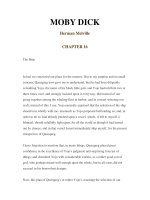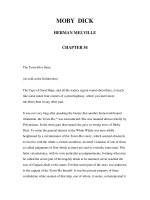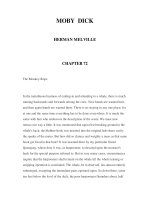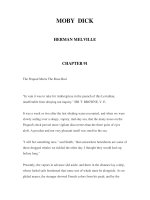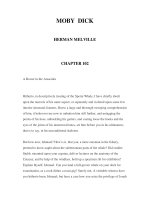Tiếng Anh y tế Unit 1
Bạn đang xem bản rút gọn của tài liệu. Xem và tải ngay bản đầy đủ của tài liệu tại đây (144.09 KB, 6 trang )
UNIT 1: HEALTHCARE
SYSTEM: VIETNAM AND
OVERSEAS
Listening
LISTENING
World healthcare system for the rich
Source: />
VOCABULARY
unequal
enormous
well off
(adj
)
(adj
)
(adj
)
gap
(n)
fend for yourself
(v)
in which people are treated in different ways or have
different advantages in a way that seems unfair
in which people are treated in different ways or have
different advantages in a way that seems unfair
having a lot of money
a space between two things or in the middle of something,
especially because there is a part missing
to take care of yourself without help from anyone else
USEFUL STRUCTURE
to have access to
something
concentrate on
something
make profit on
something
In far too many cases, people who are well-off and
generally healthier have the best access to the best care
Health care is often delivered according to a model that
concentrates on diseases, high technology, and specialist
care.
Health care today is frequently treated as something which
hospitals can make profits on.
EXERCISE
Question 1-8
TRUE / FALSE
Look at the article’s headline and guess whether these sentences are true (T) or false (F):
1.
2.
3.
4.
5.
6.
7.
8.
The UN has made a special healthcare system just for rich people.
The gap between rich and poor is 30 times wider than it used to be.
People who live in the same city generally receive the same healthcare.
A UN report says it’s sad that hospitals are out to make profits.
The UN recommends a return to the healthcare system of the 1970s.
Healthcare today is based on a system of visiting family doctors.
The UN said today’s healthcare systems follow the wrong model.
Healthcare costs push 100 million a year below the poverty line.
Question 1-6
Listen and fill the gap
According to a report of the United Nations, the healthcare systems around the world
are 9 _______. The healthcare gap between the rich and the poor today is wider than it
was 10 ________ ago. Healthcare today is considered as something for the hospitals to
make profit on. A more basic primary healthcare in which the sick could visit a 11
_________ and get the treatment they needed is now recommended by the WHO. Instead
of focusing on 12 ________ of society, healthcare today concentrates on diseases, 13
__________ and specialist care. Primary healthcare is a smarter way to get health
development 14 _________.
DISCUSSION
Is the healthcare gap between the rich and the poor a major problem in Vietnam?
What should Vietnamese government do to improve the situation?
Reading
TEXT
Healthcare in Vietnam
Vietnam is currently working to develop a universal healthcare system, which will cover
all residents and provide them with basic healthcare. For that purpose, Vietnam works
closely with Thailand’s government to model its universal healthcare after their example.
There were several reforms implemented during the spring of 2014.
Firstly, there was a reform to increase the physicians’ pay. There was also a reform to
strengthen the domestic generic drug sector, and finally a 5-year transition plan for
hospitals, expected to end in 2016.In May 2014 the World Bank approved a 106 million
USD credit to help improve the quality of the healthcare system in Vietnam. However,
the Vietnamese government still only invests a small percentage of its GDP in healthcare.
It is, however, worth noting that between 2014 and 2015, 2.7 million people acquired
health insurance coverage, thanks to efforts from the government. As of July 2015,
71.4% of the population was covered, and the goal is to achieve 80% coverage by 2020.
Even though the situation is getting better, as an expatriate, your best bet is probably to
take out private health insurance to cover your healthcare costs throughout your stay.
Quality of Medical Care: Good in Cities, Improving in Rural Areas
Vietnam has made excellent progress since the 1990s and is today generally providing
good quality healthcare. The average life expectancy in Vietnam is 73 and the child
mortality rate has decreased significantly. Still, the improvement of the current healthcare
service is an important part of the reforms previously mentioned.
Reforms are especially necessary in rural areas of Vietnam. Expats moving to areas
removed from an urban center will soon notice that sufficient medical care is often not
readily available in smaller towns and villages. Local hospitals and doctor’s practices are
often not up to modern standards.
Doctors and Hospitals for the International Community
You will not have too much of a hard time finding a doctor or a hospital if you live in
Hanoi, Ho Chi Minh City or any other big city in Vietnam. Doctors usually work in
hospitals or joint practices. For instance, the Family Medical Practice in Hanoi has
several doctors who are used to dealing with the needs of Vietnam's international
community.
In Hanoi alone, there are several large hospitals that are very well equipped to deal with
expatriates and their needs. Among them are two dental clinics and a branch of the
International SOS Clinic. The latter employs both Vietnamese and expatriate staff. The
languages spoken include Chinese, Russian, English, French, Korean, and Spanish,
among others.
Source: />
VOCABULARY
implement
domestic
generic
(v)
(adj
)
(adj
)
life expectancy
(n)
mortality
(n)
expatriate
(n)
to make something that has been officially decided start to
happen or be used
of or inside a particular country; not foreign or
international
(of a product, especially a drug) not using the name of the
company that made it
the number of years that a person is likely to live; the
length of time that something is likely to exist
the number of deaths in a particular situation or period of
time
a person living in a country that is not their own
GRAMMAR
- ing and –ed clauses in relative clauses
•
-ing clauses are used to say what somebody (or something) does. –ing clauses
have active meaning.
Ex: Expats moving to areas removed from an urban center will soon notice that
sufficient medical care is often not readily available in smaller towns and villages.
• -ed clauses have passive meaning.
Ex: There were several reforms implemented during the spring of 2014.
The languages spoken include Chinese, Russian, English, French, Korean, and
Spanish, among others.
EXERCISE
Question 1-5
Read the text carefully and choose the correct answer.
1. Which country’s healthcare system does Vietnam build its system after?
A. Thailand
B. China
C. America
2. Which reform is not implemented by Vietnamese government to develop a universal
healthcare system?
A. reform to increase the physicians’ pay
B. reform to strengthen the domestic generic drug sector
C. reform to modernize the hospitals’ systems
3. The proportion of Vietnam’s GDP is invested into healthcare is
A. large
B. small
C. not given
4. Healthcare in rural areas of Vietnam
A. especially needs reforms
B. is as good as healthcare in cities
C. has up-to-standard hospitals and doctors
5. The International SOS Clinic
A. employs both Vietnamese and expatriate staff
B. speaks Vietnamese and English
C. employs only foreigners
DISCUSSION
What do you think about the health care for international community in Vietnam?
What can we do to improve it?


